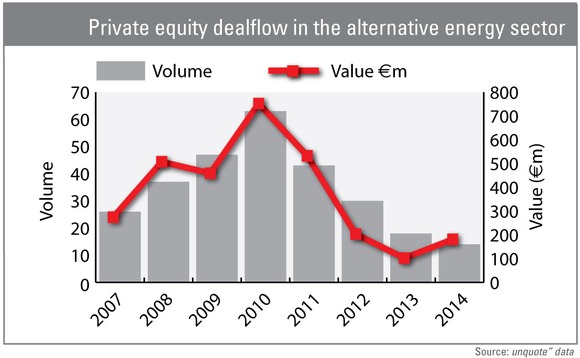
Is private equity turning away from renewables?

Vidur Sachdeva looks back on private equity’s involvement in the clean energy sector since the European Union’s 2007 announcement of ambitious renewable energy targets.
In March 2007, the European Union set itself ambitious renewable energy objectives as part of the larger ‘20-20-20' strategy: to achieve a 20% decline in greenhouse gas emissions, a 20% rise in energy efficiency, and boost the share of energy consumption sourced from renewable resources.
According to unquote" data, several interesting trends have emerged in the alternative energy sector over the last eight years. As seen in the chart below, dealflow rose sharply between 2007-2010, before witnessing a dramatic decline during the subsequent four years (2011-2014). By the end of 2014, only 14 deals were reported in the sector – 78% below the peak of 63 deals noted in 2010. Similarly, aggregate deal value remained 76% below its 2010 peak.
As compared to the 173 transactions completed in the sector between 2007-2010, only 105 such deals were reported in 2011-2014 – representing a decline of 39%, or 68 fewer transactions. In terms of aggregate deal value the decline was even more pronounced, halving from approximately €2bn to €1bn.

Drilling down by country, the UK noted the steepest decrease in terms of total deal volume, down by 16 transactions from 47 deals in 2007-2010 to 31 deals in 2011-2014. Other countries that witnessed sharp declines in deal volume were France, Spain and – surprisingly – Sweden. These four countries represented nearly 76% of the decline in total deal volume.

In terms of deal value, Germany, Spain, Denmark and the UK accounted for the largest declines (of €276m, €145m, €151m and €104m, respectively). In other words, the four countries accounted for nearly 70% of the loss in total deal value.

The analysis also reveals that of the 17 countries examined, only three recorded an increase in total deal volume: Belgium (up by three deals); Germany (up by a single deal); and Luxembourg (which was also up by one deal). Finland, France and Luxembourg were the only three countries that reported an increase in total deal value, rising by €81m, €25m and €10m, respectively.
The following two league tables also allude to the declining size of private equity investments in renewables. Of the transactions with a disclosed deal value, the largest deal between 2007-2010 was the €158m acquisition of Seajacks International by Riverstone. In comparison, the largest deal during 2011-2014 was valued at €100m – Clyde Blowers Capital's acquisition of Finnish wind turbine and gear manufacturer Moventas.


Perhaps another way of tracing the evolution of the alternative energy sector is to view it against the background of the larger oil and gas sector. Within the oil and gas sector, unquote data" categorises three sub-industries: alternative energy; oil equipment, services and distribution; as well as oil and gas producers. The four years to 2010 witnessed a steady increase in alternative energy deals' share of the aggregate deal volume – from 54% in 2007 to 80% in 2010. However, this declined to 31% in 2014.

Similarly, alternative energy's share of aggregate deal value rose sharply from 8% in 2007 to 52% in 2010, before declining to 20% in 2011 and 11% in 2014.
So what has caused interest among institutional investors in the renewable energy sector to wane dramatically over the last four years? Industry participants suggest it is largely due to unpredictable government policies. Specifically, many European administrations have decided to retroactively withdraw subsidies for renewable energy, severely shaking investor confidence.
For example, in a surprise move, Spain eliminated subsidies for alternative energy technologies, prompting investors to file multiple lawsuits against the country over the past three years. Other countries that have recently modified their renewable energy laws include Bulgaria, the Czech Republic, Greece, Italy and Romania. As a result, institutional investment in renewables now stands at its lowest point in the last eight years.
Latest News
Stonehage Fleming raises USD 130m for largest fund to date, eyes 2024 programme
Multi-family office has seen strong appetite, with investor base growing since 2016 to more than 90 family offices, Meiping Yap told Unquote
Permira to take Ergomed private for GBP 703m
Sponsor deploys Permira VIII to ride new wave of take-privates; Blackstone commits GBP 200m in financing for UK-based CRO
Partners Group to release IMs for Civica sale in mid-September
Sponsor acquired the public software group in July 2017 via the same-year vintage Partners Group Global Value 2017
Change of mind: Sponsors take to de-listing their own assets
EQT and Cinven seen as bellweather for funds to reassess options for listed assets trading underwater







